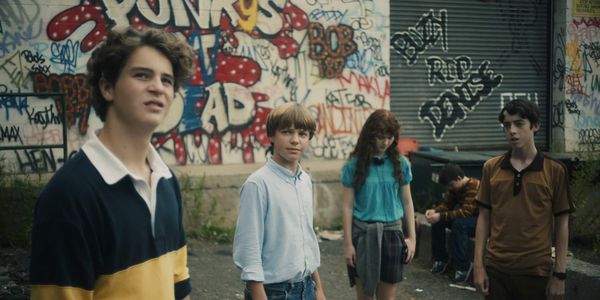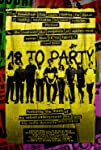Eye For Film >> Movies >> 18 To Party (2019) Film Review
18 To Party
Reviewed by: Jennie Kermode

In terms of music and club culture, 1984 was a great time to be young. But what if you were too young? Jeff Roda's big screen début follows a group of 13 and 14-year-olds who really want to get into a nightclub and join the party. One of the bouncers - who may or may not be reliable - has agreed to sneak them in, but not until late, when the place is crowded and nobody will notice. In the meantime, they have to stay out of the way, so they hang out round the back, sitting on walls or kicking at the dirt, exchanging school gossip, bitching and flirting and discussing the big issues in life almost without noticing.
Early on, Roda makes no overt moves to centre any one character. Kids come and go and those with stronger personalities gradually make themselves known. Shel (Tanner Flood) has a classic Eighties nice boy hero quality about him but worries that he's not really cool enough for the others, an attitude that could get him in trouble. He has a crush on classmate Amy (Alivia Clark), but despite the urging of best friend Brad (Oliver Gifford), whose power over him relates in part to promising him a place to crash and helping him lie to his mother, he stubbornly refuses to do anything about it. She, frustrated by this, is ready to take risks to make him jealous.

Dangerous older boy Lanky (James Freedson-Jackson) might provide an opportunity. Some of the kids describe him as a psycho, but even they regard him with a degree of awe, not just because of his age but because his brother has died, pushing him into a psychological space which they recognise as beyond their comprehension. One has to be older to put things in perspective, to recognise how screwed up he is and to see the similarity between that and what some of the others are going through, especially the aggressive, in-your-face Kira (Ivy Miller), whose efforts to force her way into adulthood are coloured by a difficult home life. Meanwhile still others anchor us in time with their conversations about computer games, whether or not U2 are cool, and the ridiculousness of adults still thinking that anyone cares about that business with Richard Nixon.
Where are the adults whilst all this is going on? Away looking for UFOs, it seems. Rumours are exchanged about lights seen in the sky. Could an invasion be on its way? Anything seems possible. As in the recent Chilean drama Forgotten Roads, the possible aliens are significant mostly because of their capacity to provoke wonder and to help small town people recognise that beyond their insular social circles there are greater forces at work. This provides some of the film's best moments.
There are no grand dramas or major shocks here, despite a few hints in that direction. Roda is interested in the little things that make up the stuff of life at that age. He gets fine performances from his young cast, with Freedson-Jackson the standout in a role that provides more room to move. It's a film for people who end up in the kitchen at parties, where the music is quieter and conversations grow stranger in the small hours.
There's something of the magic that comes from stepping outside the usual frame of life and seeing things, together, from a different perspective. In days to come, nights like these will blur together in memory. Those who were there will forget the specifics but will remember the way they felt. Roda takes us beyond nostalgia to remember the tedium and pettiness that were part of the package. It's the roughness and realism of the kids' situation that makes it interesting. Anybody can make a film in which things happen. It takes a little more courage to pull of a film about what it feels like when they don't.
Reviewed on: 13 Nov 2020

















